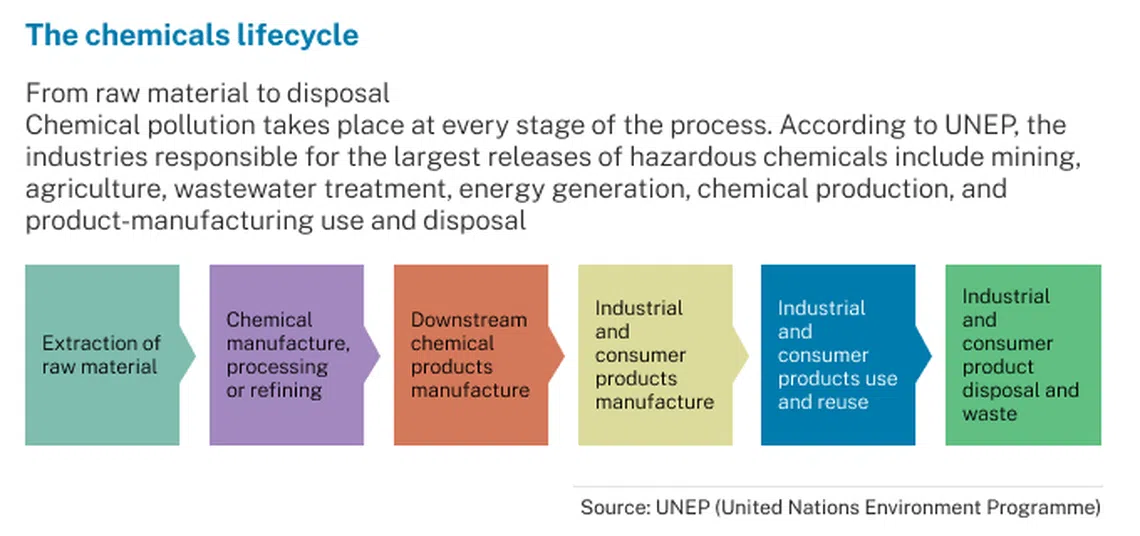Marine environment at risk as chemicals pollution grows
Similarly threatened are the revenues and livelihoods earned through Earth's oceans and seas, says Back to Blue's report.

Marine pollution - through chemicals and plastics - is escalating, threatening not just the environment but also the revenues that are earned through the Earth’s oceans and seas; and, it is a growing global problem that requires urgent and coordinated action.
That's according to a recent report, titled “The Invisible Wave: Getting to zero chemical pollution in the ocean”, produced by Back to Blue - an initiative by Economist Impact and The Nippon Foundation focused on evidence-based approaches and solutions tackling escalating ocean challenges.
Economist Impact is part of The Economist Group, and The Nippon Foundation is a private, non-profit grant-making organisation.
Their 268-page report says that marine chemical pollution - which is predominantly due to human actions - is getting to be more and more severe, with humans producing far more chemicals in ever-greater volumes.
“Thousands of new chemicals are coming onto the market every year, in addition to the 350,000 or so identified chemicals and mixtures of chemicals already in existence, most of which we know very little about in terms of their toxicity and harmfulness to the environment or human health,” says Charles Goddard, editorial director at Economist Impact.
“Many of these chemicals - used in products from household cleaning products to sunscreen - are leaching into the environment and into the sea, and damaging marine life and ecosystems.
Navigate Asia in
a new global order
Get the insights delivered to your inbox.
“Acting now to reduce and eliminate these risks across the entire chemicals value chain - from producers to retailers and consumers - has never been more urgent,” Goddard stresses.

The imperative becomes even greater when one realises that marine pollution is deeply connected to climate change - making the solving of one issue dependent on the other.
“The effects of pollution caused by chemicals and plastics can be magnified by the adverse impacts of climate change in the seas,” Goddard says.
But a big challenge in tackling the issue is the knowledge gap that exists, given the monumental task it is to evaluate, register and monitor just the new chemicals coming out onto the market each year. Much more science is needed to fully understand the scale and impact of marine pollution, Goddard says.
Still, it’s crucial to act now. Back to Blue’s report says that trillions of dollars in ocean services are at risk: in the Gulf of Mexico alone, it estimates that the worsening of ‘dead zones’ from nutrient pollution would cost the US about US$838 million a year in fisheries revenues.
It adds that coordinated action from everyone in the chemicals value chain - from the chemicals industry itself to governments, regulators, investors and financiers, as well as civil society and consumers - is needed to tackle the problem.
It recommends that:
- Regulators enact and enforce stricter rules on pollution, particularly in the Asia-Pacific, the Middle East and Africa, where much of the future growth in chemicals production will come from, and where often there is limited oversight and capacity to deal with chemical pollution;
- The chemicals sector - encompassing fossil fuel-based chemicals, specialty chemicals, pharmaceuticals and agricultural chemicals - needs to act, as it presents the most compelling opportunity to address the problem;
- There be a greater push for a circular economy, and a recognition that green chemistry – which offers an opportunity to design high-performance products that are less toxic and less polluting - may be a route to reducing pollution;
- Educating the finance and investment communities, which are still largely unaware of marine chemical pollution and its associated risks; better information will be an important first step to any finance sector-led solutions;
- Educating the public about the danger of marine chemical pollution - consumers, notably, could influence marine chemical pollution through purchasing decisions.
Yohei Sasakawa, chairman at The Nippon Foundation, says: “It is my hope that the findings will help drive international dialogue to address this issue and help the global community to realise that, without drastic steps to ensure a healthy ocean environment, there is no guarantee for the sustainable continuation of humankind.”
Copyright SPH Media. All rights reserved.

